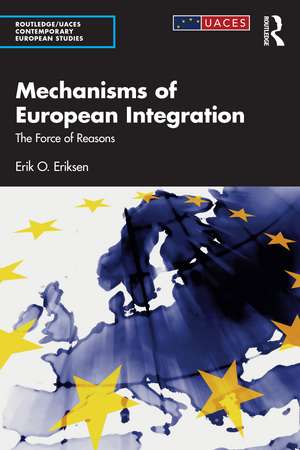Mechanisms of European Integration: The Force of Reasons: Routledge/UACES Contemporary European Studies
Autor Erik O. Eriksenen Limba Engleză Paperback – 4 feb 2025
The book pursues the force of public reason in getting to agreement beyond the nation state and spells out the fundamentals of the European integration process theorizing the mechanisms that brought the European Union into existence. The book combines insights from social and political theory, law, and political science in setting out a novel theory of European integration and reconstructing the normative foundation of the EU. It goes on to establish the problem of arbitrary rule (dominance) created by political differentiation, examines the place of democracy in the multilevel constellation that makes up the EU, and proposes a set of democratic reforms.
This book will be of key interest to scholars and students of EU studies, European integration, democracy, and international political theory/philosophy.
| Toate formatele și edițiile | Preț | Express |
|---|---|---|
| Paperback (1) | 310.84 lei 3-5 săpt. | +20.59 lei 7-13 zile |
| Taylor & Francis – 4 feb 2025 | 310.84 lei 3-5 săpt. | +20.59 lei 7-13 zile |
| Hardback (1) | 1059.00 lei 6-8 săpt. | |
| Taylor & Francis – 4 feb 2025 | 1059.00 lei 6-8 săpt. |
Din seria Routledge/UACES Contemporary European Studies
-
 Preț: 312.34 lei
Preț: 312.34 lei -
 Preț: 348.15 lei
Preț: 348.15 lei - 9%
 Preț: 1005.57 lei
Preț: 1005.57 lei -
 Preț: 393.09 lei
Preț: 393.09 lei -
 Preț: 325.38 lei
Preț: 325.38 lei -
 Preț: 287.68 lei
Preț: 287.68 lei - 18%
 Preț: 945.80 lei
Preț: 945.80 lei -
 Preț: 275.30 lei
Preț: 275.30 lei -
 Preț: 284.52 lei
Preț: 284.52 lei -
 Preț: 464.54 lei
Preț: 464.54 lei -
 Preț: 464.54 lei
Preț: 464.54 lei - 18%
 Preț: 1057.75 lei
Preț: 1057.75 lei - 18%
 Preț: 1055.51 lei
Preț: 1055.51 lei - 18%
 Preț: 703.79 lei
Preț: 703.79 lei - 34%
 Preț: 822.34 lei
Preț: 822.34 lei - 15%
 Preț: 66.82 lei
Preț: 66.82 lei -
 Preț: 413.33 lei
Preț: 413.33 lei -
 Preț: 284.52 lei
Preț: 284.52 lei - 18%
 Preț: 1000.27 lei
Preț: 1000.27 lei - 18%
 Preț: 699.96 lei
Preț: 699.96 lei -
 Preț: 391.57 lei
Preț: 391.57 lei -
 Preț: 460.69 lei
Preț: 460.69 lei - 18%
 Preț: 1065.06 lei
Preț: 1065.06 lei -
 Preț: 464.54 lei
Preț: 464.54 lei -
 Preț: 315.29 lei
Preț: 315.29 lei - 18%
 Preț: 1054.71 lei
Preț: 1054.71 lei -
 Preț: 483.49 lei
Preț: 483.49 lei -
 Preț: 411.64 lei
Preț: 411.64 lei - 12%
 Preț: 312.43 lei
Preț: 312.43 lei - 26%
 Preț: 850.59 lei
Preț: 850.59 lei - 18%
 Preț: 1060.11 lei
Preț: 1060.11 lei - 15%
 Preț: 701.45 lei
Preț: 701.45 lei -
 Preț: 440.21 lei
Preț: 440.21 lei -
 Preț: 386.51 lei
Preț: 386.51 lei -
 Preț: 462.60 lei
Preț: 462.60 lei
Preț: 310.84 lei
Nou
Puncte Express: 466
Preț estimativ în valută:
59.48€ • 62.10$ • 49.23£
59.48€ • 62.10$ • 49.23£
Carte disponibilă
Livrare economică 14-28 martie
Livrare express 28 februarie-06 martie pentru 30.58 lei
Preluare comenzi: 021 569.72.76
Specificații
ISBN-13: 9781032893754
ISBN-10: 1032893753
Pagini: 266
Ilustrații: 6
Dimensiuni: 156 x 234 x 18 mm
Greutate: 0.4 kg
Ediția:1
Editura: Taylor & Francis
Colecția Routledge
Seria Routledge/UACES Contemporary European Studies
Locul publicării:Oxford, United Kingdom
ISBN-10: 1032893753
Pagini: 266
Ilustrații: 6
Dimensiuni: 156 x 234 x 18 mm
Greutate: 0.4 kg
Ediția:1
Editura: Taylor & Francis
Colecția Routledge
Seria Routledge/UACES Contemporary European Studies
Locul publicării:Oxford, United Kingdom
Public țintă
Postgraduate and Undergraduate AdvancedCuprins
Part 1: Squaring the circle on rationality and acceptability 1. Introduction: The rationality/acceptability gap 2. The right-making force of public reason 3. Rational irrationality: On bargaining and arguing 4. Deliberative inquiry: Probing the conditions for legitimate solutions 5. Rational acceptability and its limitations 6. Deliberative decision-making 7. Claims-making, justification, and learning Part 2: European integration: Autonomy and heteronomy 8. European integration: the force of democracy 9. The European parliament puzzle: from disagreement to agreement 10. Differentiation, segmentation, and the spectre of dominance 11. Habermas versus Habermas on European democracy 12. Regional cosmopolitanism and hierarchical self-intervention. Postscript
Notă biografică
Erik O. Eriksen is Professor of Political Science and former Director of ARENA at the University of Oslo, Norway.
Recenzii
"In an unruly world, Mechanisms of European Integration sets out a much-needed and compelling vision of how our democracies remain governed by reason. As a critical case, Eriksen offers an alternative explanation of European integration – one that is not immune to setbacks but is in the end confident about its progressive vocation. This is a book that recognizes the major political challenges of our era but that also reinforces the confidence and the capacities of democracies to address them."
Ben Crum, Vrije Universiteit Amsterdam, The Netherlands
“This book demonstrates how political theory can help us comprehend and improve the European project. It is a must-read for anyone who cares about the future of the old continent.”
Jan Zielonka, University of Venice, Ca Foscari, Italy.
Ben Crum, Vrije Universiteit Amsterdam, The Netherlands
“This book demonstrates how political theory can help us comprehend and improve the European project. It is a must-read for anyone who cares about the future of the old continent.”
Jan Zielonka, University of Venice, Ca Foscari, Italy.
Descriere
This book posits the possibility of a reasons-based account of the European integration process.
